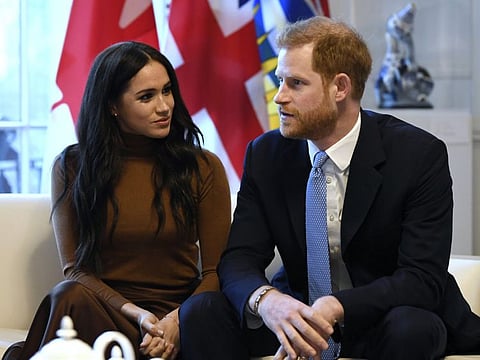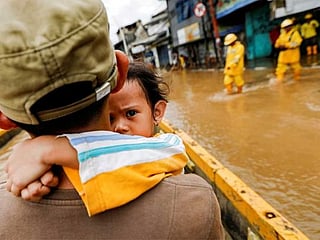2020 in review: In a year dominated by pandemic, many other events unfolded
Armed conflicts, explosions and deaths were overshadowed by COVID-19

Washington: Not since World War II has a single phenomenon dominated the news worldwide as the COVID-19 pandemic has in 2020. In the United States, a tumultuous presidential election and a wave of protests over racial injustice also drew relentless coverage.
Overshadowed, to an extent, were other dramatic developments. Among them: an apocalyptic explosion in Beirut, the shocking helicopter-crash death of basketball icon Kobe Bryant and his daughter.
Some seemingly epic events early in the year now seem distant, like President Donald Trump’s impeachment trial and the January announcement by Prince Harry and Meghan Markle that they were exiting their prominent roles in Britain’s royal family. Just a few weeks later came the long-awaited Brexit, Britain’s formal withdrawal from the European Union.
As most of the world battled COVID-19, armed conflicts broke out between Armenia and Azerbaijan and in Ethiopia’s Tigray region. Afghanistan’s seemingly endless war dragged on, even as the warring sides warily edged into peace talks. Massive protests challenged the ruling powers in Belarus and Thailand.
Due to past instances of sexual assault and sexual abuse, Hollywood mogul Harvey Weinstein received a 23-year prison sentence and the Boy Scouts of America filed for bankruptcy protection.
Some other major events of 2020:
Iran: The year ended as it began with tensions between Iran and the US inflamed by the killing of a top official. On Jan. 3, a US drone strike killed Revolutionary Guard Gen. Qassem Soleimani. Iran responded with a missile attack that injured dozens of US troops in Iraq. In December, a mysterious attack near Tehran killed a nuclear scientist whom the US and others had identified as organising Iran’s effort to seek nuclear weapons two decades ago. Iran blamed that attack on Israel.
Immigration: Throughout 2020, the Trump administration pushed to extend a wall along the US-Mexico border, even as it implemented immigration policies that outraged human-rights advocates. The targets included unaccompanied children seeking refuge in the US - hundreds were detained in hotels before being expelled. The administration also sought to suspend the Deferred Action for Childhood Arrivals programme that protects some young immigrants from deportation. But a federal judge ruled that new applications for the programme must be accepted.
Opioids: Purdue Pharma, the maker of OxyContin, pleaded guilty to three criminal charges, formally taking responsibility for its part in an opioid epidemic that has contributed to the deaths of more than 470,000 Americans over two decades. Purdue admitted impeding efforts to combat the addiction crisis. The pleas arose from a settlement that includes $8.3 billion in penalties and forfeitures, but victims’ advocates worried that Purdue’s owners, the Sackler family, might emerge with their fortune largely intact.
Notable Deaths: For sports fans worldwide, 2020 was sadly bookended by the deaths of two popular superstars - basketball’s Kobe Bryant, 41, and soccer’s Diego Maradona, 60. Among those killed along with Bryant in the helicopter crash was his 13-year-old daughter Gianna, herself a promising athlete. Other revered figures who died included US civil rights leader John Lewis, guitarist Eddie Van Halen, and actors Chadwick Boseman and Sean Connery. Many admirers of liberal US Supreme Court Justice Ruth Bader Ginsburg not only mourned her death, but deplored her replacement by a conservative, Amy Coney Barrett.
Beirut Explosion: Lebanon’s capital was devastated in August by one of the largest non-nuclear explosions ever recorded. A fire detonated a stockpile of nearly 3,000 tons of ammonium nitrate left to rot at a port warehouse. The explosion tore through Beirut, sucking in the air and blowing up homes as windows shattered for miles around. More than 200 people were killed and thousands injured, compounding the woes of a nation already beset by mass protests and economic meltdown.
France-Muslims: The October beheading of a teacher by an 18-year-old Chechen outside Paris, followed by the killing of three people in Nice by a Tunisian migrant, prompted France to declare its highest-level security alert. The attacks came amid a trial over the 2015 massacre at the satiric newspaper Charlie Hebdo, which had published cartoons of Prophet Mohammed (PBUH). The teacher was beheaded for showing the cartoons to his class while discussing freedom of expression - vigorously defended by President Emmanuel Macron. The caricatures and Macron’s stance fuelled calls from Muslim nations to boycott French products - and some French Muslims resented the security crackdown.
Hurricanes: It was such a historically busy hurricane season that forecasters had to turn to the Greek alphabet after running out of assigned names. In the US, Louisiana took the brunt of the onslaught: three hurricanes and two tropical storms. The worst to hit the state was Hurricane Laura, which swept ashore in August. In November, several Central American countries were ravaged by two Category 4 hurricanes. In Tennessee, an outbreak of tornadoes in March killed 25 people.
Wildfires: Thousands of wildfires raged throughout the western US, claiming dozens of lives, destroying thousands of homes, and bringing apocalyptic scenes of orange skies and hazardous air. Months before the usual start of the wildfire season, drought, extreme warm temperatures and winds gusting up to 160 kmph fuelled some of the most destructive blazes in the region’s history. Scientists say climate change is responsible for more intense and frequent extreme events such as storms, droughts, flooding and wildfires - including massive brush fires that raged for months in Australia.
Sign up for the Daily Briefing
Get the latest news and updates straight to your inbox








